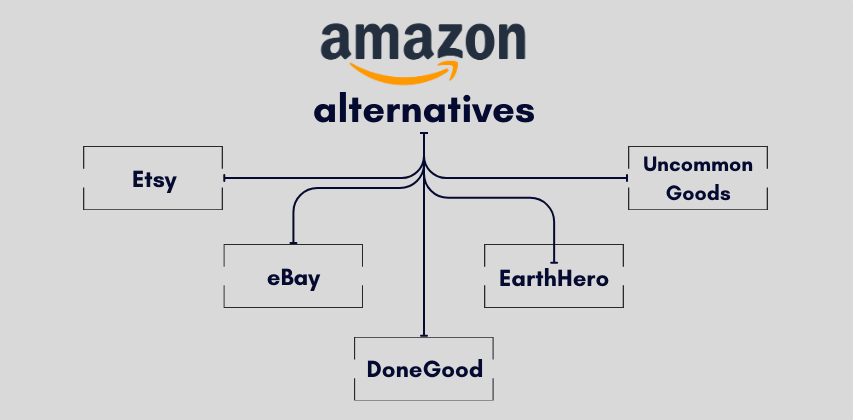Amazon has long been the king of online retail, offering unparalleled convenience, endless deals, and the popular Amazon Prime service. However, not all businesses find Amazon to be a suitable platform, especially those that want to align their values with their online presence.
In this article, we explore why certain businesses are seeking alternatives to Amazon and highlight some ethical, friendly, and sustainable players in the ecommerce market.
Amazon: a Goliath in the ecommerce market
Amazon is a vast online retail ecosystem that enables third-party sellers to list and sell their products alongside Amazon’s offerings. It operates as a virtual marketplace, connecting buyers and sellers and offering various products and services. Amazon, founded by Jeff Bezos in 1994 as an online bookstore, has grown into one of the world’s largest and most influential ecommerce platforms.
- Amazon’s impressive catalog
One of the reasons behind Amazon’s dominance is its extensive catalog of millions of products. From electronics to clothing, books to home goods, and even groceries, it’s hard to think of a product category that Amazon doesn’t offer. This vast product selection offers consumers unparalleled choices and convenience, making it a one-stop shop for their needs. - Competitive pricing
Amazon’s commitment to competitive pricing ensures that shoppers often find products at prices that are hard to beat. The platform employs various strategies, including dynamic pricing algorithms and third-party sellers, to offer products at attractive rates. - Amazon Prime
The Amazon Prime service has become synonymous with fast and expedited shipping, offering consumers a subscription-based model that guarantees quick delivery on countless items. The membership also includes exclusive deals, streaming services, and more, making it a compelling offering for frequent Amazon shoppers.
You might find it interesting to know how to start selling on Amazon effectively.
Why Amazon might not suit all businesses
While Amazon’s extensive reach and impressive sales numbers may seem like a dream come true for businesses, it comes with its challenges that might scare away merchants. Let’s explore why Amazon doesn’t fit everyone, and some might want to look for an alternative marketplace.
Amazon’s dominance and competition
We said that Amazon was a popular marketplace, one of the leading ecommerce venues. So, you can only imagine the competition, making it hard for some businesses to get enough exposure, particularly for smaller enterprises and entrepreneurs looking to establish their presence in the e-commerce realm.
- Competing with a behemoth
The sheer size of Amazon makes it a formidable competitor. With vast resources, a well-established customer base, and a proven track record, competing with Amazon can be like taking on a behemoth. Smaller businesses often find it challenging to gain visibility when pitted against such a giant. - Marketplace fees and costs
Amazon charges various seller fees, including referral fees, fulfillment fees, and monthly subscription fees for services like Amazon Seller Central. These costs can add up, especially for businesses with tight profit margins. - Algorithmic competition
Amazon’s search and recommendation algorithms promote products based on various factors, like customer reviews, price, and fulfillment speed. It can be challenging for new or niche businesses, as it can take time to accumulate the necessary data and positive reviews to compete effectively.
Limitations for ethical, sustainable, and eco-friendly product selling
While Amazon’s wide-reaching platform is excellent for conventional products and mainstream consumer goods, it may not be the ideal choice for businesses with an ethical or sustainable focus. Let’s find out why.
- One-size-fits-all model
Amazon operates as a one-size-fits-all platform. While this is ideal for the average consumer, it may not cater well to businesses prioritizing eco-friendliness, social responsibility, or fair trade practices. The platform does not inherently highlight these products or the stories behind them. - Limited visibility for ethical products
Ethical and sustainable products may not get the visibility they deserve on Amazon, as they often compete with various mass-produced items. Customers looking for eco-friendly or socially conscious goods might need to sift through numerous unrelated options to find what they seek. - Ethical certifications
Many ethical and sustainable products require specific certifications like Fair Trade, Organic, or Carbon-Neutral. Amazon doesn’t allow for prominently displaying these distinctions, as they do on specialized ethical e-commerce platforms. It can make it harder for businesses to convey their commitment to these values to potential customers.
Further, we will explore Amazon alternatives, catering specifically to ethical, sustainable, and user-friendly products. These platforms provide a more tailored environment for businesses with unique missions and values.
Exploring the market of ethical, sustainable, and eco-friendly ecommerce
Before exploring alternatives to Amazon that cater to the needs of ethical, sustainable, and eco-friendly ecommerce, we’ll dive, real quick, into the definition of it.
Ethical ecommerce
Ethical ecommerce pertains to online retail that prioritizes fair trade, social responsibility, and transparent business practices in the production and sale of goods.
Ethical ecommerce emphasizes the fair treatment of workers involved in the production process, sustainable sourcing of materials, and ensuring that business practices align with ethical standards. It often includes fair wages, safe working conditions, and eco-friendly production processes.
Sustainable ecommerce
Sustainable ecommerce is the process of buying and selling goods through online platforms to reduce environmental impact, promote ecological balance, and support sustainable business practices.
The main objective of sustainable ecommerce is to minimize the ecological footprint of the products sold and the operations of the e-commerce platform itself. There are several measures in place to achieve this goal, such as reducing waste, using eco-friendly packaging, employing renewable energy, and advocating for sustainable supply chain practices.
Eco-friendly ecommerce
Eco-friendly ecommerce refers to the buying and selling of goods through online platforms while prioritizing the use of environmentally friendly materials, processes, and practices in the production, packaging, and delivery of products.
Eco-friendly ecommerce focuses on products and practices that are mindful of the environment. This includes utilizing biodegradable or recyclable materials, decreasing carbon emissions during shipping, and endorsing products that have a minimal impact on the environment at every stage of their life cycle.
Ethical alternatives, sustainable alternatives, and eco frienfly alternatives to the Amazon marketplace
Amazon’s business model, which prioritizes fast delivery and massive scale, may not be able to fully support the stringent ethical, sustainable, and eco-friendly standards required for specialized e-commerce. Meeting these standards requires careful consideration and attention to detail, which may not align with Amazon’s broad and streamlined approach to sales.
At this point, businesses that share the idea of ethical ecommerce might want to search for alternatives to the marketplace. And below, we’ll look at some.

Etsy
Etsy, an online marketplace launched about a decade ago, stands out as a haven for unique, handcrafted, and vintage goods. It differentiates itself from larger e-commerce platforms like Amazon by focusing on individual artisans, creators, and small businesses, fostering a community-driven approach to commerce.
Etsy embodies principles of sustainability, ethics, and eco-friendliness in several ways. The platform favors handmade and vintage items, supporting sellers who engage in environmentally conscious practices. These sellers often use ethically sourced materials, prioritize sustainability in their production processes, and advocate for eco-friendly packaging and shipping methods.
Benefits for Sellers
Etsy offers various benefits for sellers committed to sustainable, ethical, or eco-friendly practices.
- The platform provides a specialized marketplace that attracts consumers seeking unique, handcrafted, or eco-conscious products.
- Sellers benefit from a built-in community of like-minded buyers, enabling them to showcase their products to a niche audience interested in supporting ethical commerce.
- Etsy’s user-friendly interface simplifies setting up and managing an online store.
- The platform offers tools for customization, enabling sellers to create a unique and appealing online presence.
- Etsy focuses on storytelling, allowing sellers to connect with their audience, share the story behind their products, and foster a deeper connection with potential buyers.
Seller fees
Etsy operates on a fee-based structure. Sellers are subject to a few types of fees, including listing fees, transaction fees, and payment processing fees.
Listing fees are nominal charges for posting items, while transaction fees are a small percentage of the sale price. Additionally, there are payment processing fees applied when a seller receives payment.
The fees support the platform maintenance and further development, providing a dedicated space for sustainable, ethical, and eco-friendly commerce.
eBay
Founded in 1995, eBay remains a stalwart in the online marketplace sphere, facilitating auctions and fixed-price sales for a diverse range of products. It offers a platform for individuals and businesses to buy and sell new and used items, making it a versatile and expansive marketplace.
eBay champions sustainability through its commitment to reuse and recycle. The platform’s emphasis on selling second-hand goods encourages a circular economy, reducing waste by giving items a second life. Moreover, eBay’s initiative to promote responsible selling aligns with ethical business practices, allowing sellers to highlight eco-friendly or fair-trade products.
Benefits for sellers
eBay’s platform provides many advantages for sellers invested in ethical and eco-friendly practices.
- eBay promotes sustainable consumer behavior by facilitating the exchange of pre-owned items, reducing the carbon footprint, and keeping them out of landfills.
- eBay supports showcasing new, eco-friendly goods, helping businesses and individuals highlight their products’ ethical sourcing, eco-conscious production methods, or environmentally friendly materials, and tap into a growing market of consumers who seek to support sustainable practices.
- eBay attracts eco-conscious buyers and responsible sellers, fostering a community of like-minded individuals and cultivating a culture of ethical consumerism that reinforces the platform’s dedication to sustainable commerce.
Seller fees
eBay operates on a fee structure that includes insertion fees for listings, final value fees based on the item’s sale price, optional upgrade fees for additional features, and payment processing fees.
DoneGood
DoneGood is an innovative marketplace that has carved its niche in the e-commerce industry by advocating for sustainability, ethical practices, and eco-friendly products. This platform aims to connect consumers with brands prioritizing social responsibility and environmental consciousness in their business operations.
DoneGood is a platform dedicated to curating a selection of sustainable, ethical, and eco-friendly products. It offers consumers an extensive array of goods, from fashion and beauty products to home goods and accessories, all sourced from brands committed to fair trade, sustainable sourcing, and ethical production methods. The platform places a strong emphasis on providing customers with transparency in understanding the ethical standards and sustainability practices of each brand and product they offer.
Benefits for sellers
- DoneGood provides a valuable opportunity to showcase sellers’ commitment to sustainability and ethics to a highly engaged audience.
- By being part of the DoneGood marketplace, sellers can access a community of like-minded consumers seeking products that align with their values.
- This exposure helps smaller brands and businesses gain visibility and credibility, which might be challenging in larger, more generalized marketplaces.
Seller fees
DoneGood operates with a fee structure that is generally considered reasonable and competitive. While specific fee details might vary based on the type of account or services a seller requires, the platform typically charges a percentage fee per transaction or subscription fee for access to the marketplace. The fees collected by DoneGood contribute to the platform’s efforts in promoting and maintaining a high standard of ethical, sustainable, and eco-friendly products.
EarthHero
EarthHero stands as a pioneer in sustainable ecommerce, offering a marketplace that caters specifically to environmentally conscious consumers. This platform hosts a curated selection of goods that are eco-friendly, sustainably sourced, and ethically produced. It’s a one-stop shop for consumers looking to make responsible and mindful purchases.
EarthHero’s ethos promotes sustainable living through every facet of its operations. It ensures that products listed on its platform are sourced and manufactured using environmentally friendly materials and methods. From biodegradable packaging to products made from recycled or upcycled materials, EarthHero emphasizes reducing the ecological impact across the product life cycle. The platform upholds ethical practices by partnering with companies committed to fair wages, safe working conditions, and sustainable production processes.
Benefits for sellers
- EarthHero presents an invaluable opportunity for businesses to reach a niche and engaged audience passionate about sustainable and ethical products. By joining EarthHero, sellers can access a platform that resonates with their values and provides a targeted marketplace for their goods.
- EarthHero has an established reputation as a sustainable and ethical marketplace. For sellers, this association can significantly enhance brand credibility, providing an edge in an increasingly conscious consumer market. EarthHero’s commitment to sustainability acts as a stamp of approval, signaling to consumers that the products offered are environmentally responsible and ethically sound.
Seller fees
EarthHero operates with a fee structure that aligns with its dedication to sustainability and ethical standards. While exact fees can vary based on product types and selling volumes, the platform typically charges reasonably to support its operational costs and maintain its commitment to sustainability. These fees often include listing fees, transaction fees, and, in some cases, a percentage of sales, ensuring sellers contribute to the platform’s sustainable operations.
Uncommon Goods
Uncommon Goods is an online marketplace recognized for curating a diverse range of handcrafted, artistic, and often unconventional products. It differentiates itself by championing a business model centered around ethical production practices, sustainability, and eco-friendly initiatives.
The hallmark of Uncommon Goods lies in its dedication to ethical sourcing and sustainable production. The platform showcases products crafted with recycled or upcycled materials, thus promoting eco-friendly practices. Their commitment extends to ensuring fair wages for artisans and a transparent supply chain, supporting social responsibility and ethical standards in production.
Benefits for sellers
For sellers, Uncommon Goods offers a coveted space to showcase their unique and distinctive products to a community of conscientious consumers. The platform’s emphasis on ethical and sustainable goods allows sellers to connect with an audience that appreciates the value of such products, creating a market niche not commonly found in mainstream e-commerce platforms. This fosters a community of sellers who share the platform’s commitment to ethical commerce.
Seller fees
Uncommon Goods operates with a curated approach to product selection, maintaining a focus on quality and ethical production. As a result, the platform may charge higher fees or commission rates for sellers. While specific fee structures can vary based on the type of products and sales volume, sellers might encounter listing fees, transaction fees, or higher commission rates. However, these fees are often justified by the platform’s commitment to supporting ethical, sustainable, and eco-friendly products.
Navigating the ecommerce market for your products
In ecommerce, choosing the right platform to showcase and sell your products is a pivotal decision for any business. When navigating the ecommerce market for your products, several critical considerations can significantly influence the success of your online business venture.
Considerations when choosing an ecommerce marketplace
Integration with payment systems
Smooth and efficient transactions are the lifeblood of any e-commerce business. Ensuring that the chosen platform integrates seamlessly with your preferred payment processing systems is crucial. The capability to handle various payment methods, secure transactions, and streamline the checkout process enhances the overall customer experience.
For instance, platforms like Shopify and BigCommerce offer integrated payment solutions or support multiple third-party payment gateways, ensuring convenience for both the seller and the buyer.
Integration with accounting software and other business-critical systems
Seamless integration with accounting software is another vital aspect to consider. This integration simplifies financial management, streamlines bookkeeping processes, and ensures accurate reporting. By synchronizing sales and expense data with accounting software, businesses gain insights into their financial health and can make informed decisions.
For example, ecommerce platforms like Etsy, WooCommerce, or Magento offer integrations with popular accounting software like QuickBooks and Xero, facilitating easier financial tracking and management.
No less important is to assess a platform’s payment processing capabilities and find out whether it supports the integration with other payment processosr (like Square or Stripe, etc.) in addition to their in-built solution. It might help provide a better customer experience, allowing for more flexible choice of payment methods.
Niche suitability
Each online marketplace tends to attract a specific audience or cater to particular product categories. Assess whether the marketplace aligns with your product niche and target audience. Whether your business focuses on handmade crafts, sustainable products, or tech gadgets, choosing a platform that resonates with your offerings is crucial.
For instance, Etsy is well-suited for artisans and creators, while platforms like REI Co-op focus on outdoor gear and sustainable products.
Marketing and promotional support
An often overlooked aspect is the marketing tools and support provided by the platform. A robust marketing infrastructure can significantly impact your product visibility and sales. Evaluate the promotional tools offered, such as email marketing, social media integration, or advertising support within the platform.
Platforms like eBay and Amazon offer various promotional tools like sponsored product ads, enhancing product visibility to potential buyers within their respective ecosystems.
Evaluating the market fit for your products
Understanding the unique features and audience of each platform is critical. Each e-commerce platform has its unique set of functionalities, demographics, and reach. Assessing whether your product offerings align with the platform’s audience is key to success.
For instance, platforms like Poshmark cater primarily to fashion and apparel, while Houzz focuses on home improvement and decor products.
Making the informed choice
When selecting an Amazon alternative, a well-informed decision can be the difference between thriving or struggling in the online marketplace. Weigh the pros and cons of each platform and align their values with your business’s ethos.
Consider not only the seller fees but also the level of support provided. Some platforms offer extensive customer support, while others rely on user communities or have limited assistance.
Taking the time to conduct in-depth research, understanding the marketplace dynamics, and aligning these factors with your business goals can help you make a judicious decision. Ensure that the chosen platform resonates with your brand values, supports your product niche, and offers the necessary tools and support for your business to thrive.
Conclusion
The ecommerce landscape presents an array of alternatives to Amazon, tailored to the specific needs and values of businesses. Ethical, sustainable, and user-friendly marketplaces offer diverse settings for businesses seeking to align their online presence with their values. Each alternative comes with its unique set of advantages and challenges, catering to different niches within the e-commerce market. As businesses venture beyond the confines of Amazon, these diverse platforms provide a promising avenue for growth and a chance to connect with consumers who share their values.






